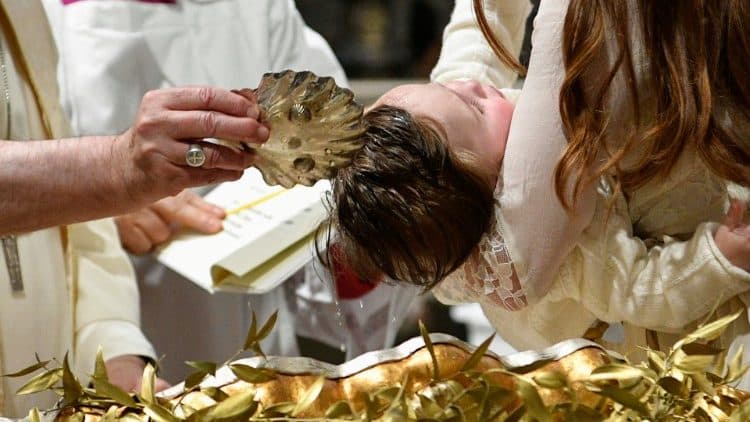The living tradition of Christian prayer has a beautiful ebb and flow that revolves around our relationship with God, the Father, Son, and Holy Spirit. As our spiritual life grows and matures, it becomes profoundly Trinitarian.
Our prayer is always offered in Jesus Christ. There is no other option for the Christian, as the Catechism of the Catholic Church teaches: “There is no other way of Christian prayer than Christ.”
Our prayers are directed to God the Father and in the power of the Holy Spirit, but they are always made in Jesus Christ and by his holy name.
The Catechism stresses the point: “Whether our prayer is communal or personal, vocal or interior, it has access to the Father only if we pray ‘in the name’ of Jesus.”
By ourselves, we cannot offer prayers to God. We do not have the legitimacy or the standing. We are sinners who have rebelled against God. We cannot approach him on our own merits, since we have none. It is only by claiming the identity given to us in our baptism and making our prayers in Jesus Christ, that they become pleasing and acceptable to God the Father.
In our pluralistic society, this teaching is very controversial. It can appear exclusive and narrow-minded to the secular person. The reality, however, is that all men and women are invited and summoned to the waters of baptism. With proper preparation, anyone can be baptized and receive adoption by God the Father in Jesus Christ.
The waters of baptism should not be minimalized or trivialized by a misunderstanding of the essential place of Jesus Christ in opening the way to the Father for us. By baptism, we become adopted children of God. We become children by grace. We can honestly call God our Father and the Lord Jesus our Older Brother. It is this familial relationship that allows us to come before God, offer our prayers, and trust in his love and providential care for us.
The unbaptized person remains a child of God by nature, but such a status is beneath what Jesus Christ has won for us. It is not equal to the level of closeness that we are offered by the Father in Jesus Christ.
In baptism, we are chosen in God. The Lord Jesus tells us: “You did not choose me but I chose you. And I appointed you to go and bear fruit, fruit that will last, so that the Father will give you whatever you ask him in my name.”
By being chosen in Jesus Christ, we enter into the communion of the Holy Trinity. As such, our prayers taken on an expression that reflects the intimate relationship of the divine persons. Our prayers become ordered by the exchange between the Father and the Son, and the Father and Son and the Spirit.
The Lord Jesus is the way. He is the one who opens the door for us. He is the gate, which is closed to no one. The Catechism continues: “The sacred humanity of Jesus is therefore the way by which the Holy Spirit teaches us to pray to God our Father.”
We need to see the Lord Jesus as Savior, Friend, Companion, and Older Brother. We need to approach his sacred humanity as the means by which we see the face of the Father and share communion with the Holy Spirit.
As the Lord Jesus loved with a human heart, worked with human hands, and cried human tears, we see the path that we are to follow. We see in the Lord’s own prayer an example and avenue for our own prayer. In all that the Lord Jesus did, he shows us how to live.
By the Paschal Mystery, the Lord Jesus ascends to the Father and takes our human nature with him. In Christ, our humanity sits enthroned at the right hand of God. And so, in both time and in eternity, the sacred humanity of the Lord is our way to the Father.
In this life, this eternal reality is reflected when our prayers are shaped and become more and more Trinitarian, namely, when our prayers are offered to God the Father, in Jesus Christ, by the power of the Holy Spirit.
For more spiritual wisdom and encouragement, please visit Father Kirby’s YouTube channel, Daily Discipleship with Father Kirby.















